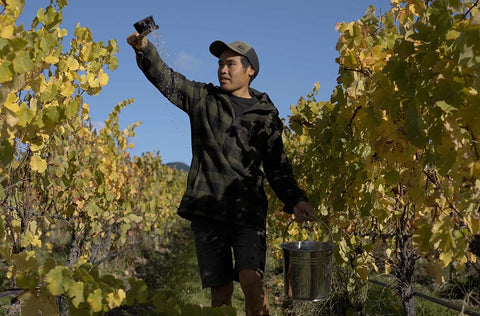Seresin Estate implemented organic growing practices early in vineyard development and became formally certified as an organic property by Biogro in 2003.
After practicing organics for a number of years, it was a natural progression to advance to biodynamics, a system we view as a more rigorous form of organic farming. Our entire estate is farmed biodynamically; this encompasses not only vineyards but our olive groves, fruit trees, native vegetation, pastoral land and vegetable gardens. Biodynamics is a system and philosophy of farming that recognises the soil and entire farm as a living organism. It is based on a series of lectures given by Rudolf Steiner in 1924, which have evolved into a form of farming that is now widely accepted and practised throughout the world, covering all forms of agriculture.
In recent years, a growing number of scientific research papers have emerged in support of the symbiotic relationship between plant vigour and the microbial health of our soils. This further re-enforces our view that respect for and care of the soil is critical to a healthy ecosystem. Both our cow pat pits and our biodynamic preparations form the cornerstone of our biodynamic activity, and create balance and health in our soils.
Raupo Creek is managed as a whole farm, with our livestock playing an essential role in the health of the estate. Every animal has a purpose and brings its own unique energy to the land. Chickens provide eggs, manure for composting, eggshells for calcium, weeding and insect control. Cows provide manure for our preparation 500, cow pat pits and composting. Sheep are used for keeping the grass down and a few pet goats provide a bit of grass mowing and entertainment. Finally, bee hives house our essential pollinators, who are fed throughout the summer season by the array of wild flower we grow in every tenth row across our 51 hectares of vineyard plantings.
We respect the biodynamic calendar and work with the cycles of the moon; focusing on growth practices in the moon’s waxing phase, and promoting soil health in the moons waning phase. Alongside this, we observe root, leaf, flower and fruit days for key activities such as harvesting, racking wines to barrel and bottling days, with the intention to maintain the fruits vibrancy throughout the winemaking process.
Over the coming months we will focus on each aspect of our biodynamic practice, taking you through the details of our CPP set up, biodynamic field spray preparations and compost preparations. For those of you with an interest in organic and biodynamic agriculture, please look out for our blog posts to learn more.

